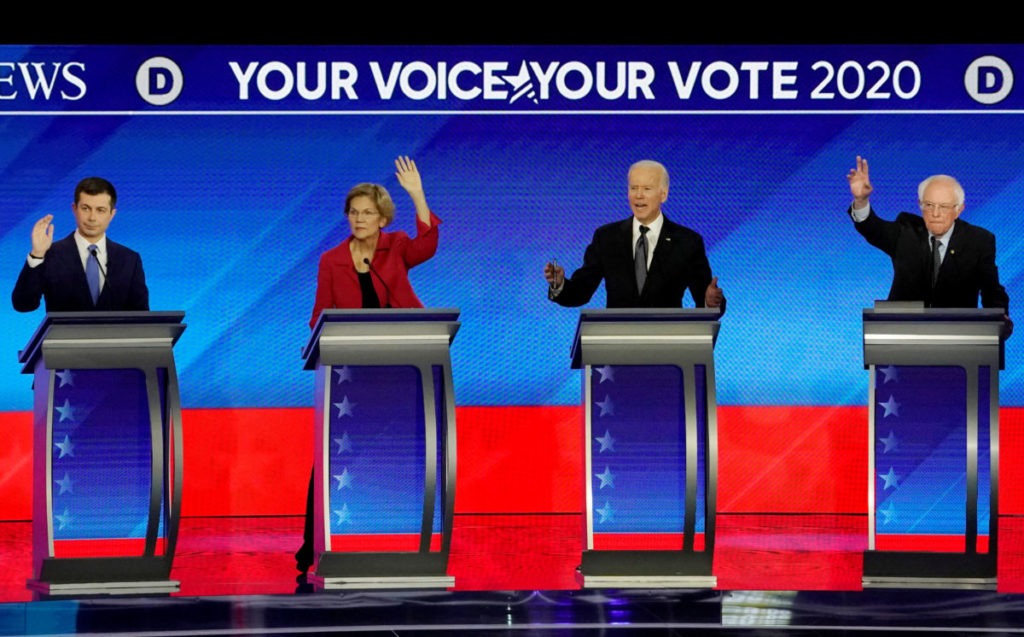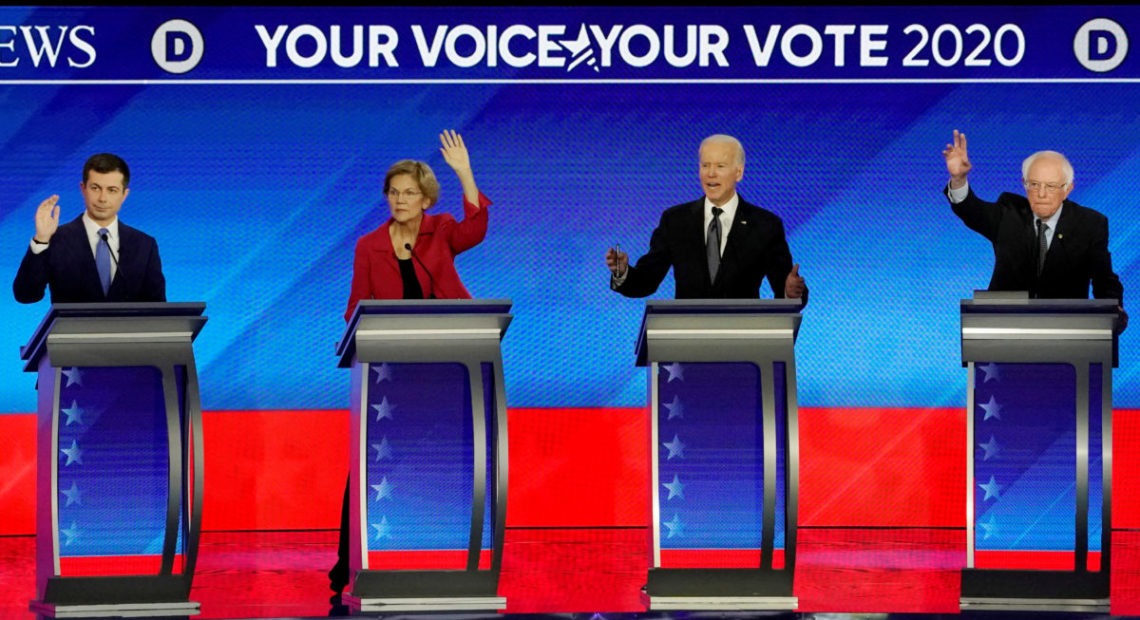There is no modern precedent, nor any clear point of comparison for the current, crowded state of the Democratic presidential race. More candidates are staying in the race longer than at any time in recent history.
In 2008, just four Democrats remained after the New Hampshire primary. Republicans came closer in 2016, with six candidates still in the hunt after the Granite State voted. But at the same point this year, eight Democrats are still standing.

Democratic presidential candidates participate in the eighth 2020 debate at Saint Anselm College in Manchester, New Hampshire, on Feb. 7, 2020. CREDIT: Brian Snyder/Reuters
Consider this additional oddity. After two contests, we have: potentially two different winners (former Mayor Pete Buttigieg with a slight Iowa delegate count lead and Sen. Bernie Sanders, I-Vt., in New Hampshire), a third candidate who is ahead in the next primary state of South Carolina (former Vice President Joe Biden) and a fourth (former Mayor Mike Bloomberg) who has soared 15 points in the past few weeks to grab second place in national polls.
While Sanders leads national polling by double digits, nearly every campaign can view the data through their own set of 2020 glasses to find a reason to stay.
Sanders
The mayor-turned-congressman-turned-senator has a commanding lead nationally, a near win and real win in Iowa and New Hampshire, respectively, and his appeal is expanding. Our recent PBS NewsHour, NPR and Marist poll shows Sanders as the top pick with all income groups; urban, suburban and rural voters; and in all regions of the country. He is also ahead with voters thought to be pivotal in any match-up with President Donald Trump: suburban women. Though that is among Sanders’ slimmest leads.
Bloomberg
Michael Bloomberg, the former mayor of New York, is on the map for two reasons. First, the $400 million-plus he has spent so far in advertising and campaigning (with plans of this number growing), and second, his astronomical rise in the national polls to second place. Thanks to that surge, he now has his first ticket to a debate. Bloomberg will be on stage Wednesday in Las Vegas ahead of the Nevada caucuses on Feb. 22.
Biden
The former vice president may have placed fourth in Iowa and fifth in New Hampshire, but his campaign could regard those as two small, not diverse states. So far he remains on top in polls in South Carolina, and in third place nationally. Forthcoming polls will show if he is holding his strong position in delegate-bonanza states of California and Texas.
Buttigieg
But, wait, what about the man who seems to be the winner of the Iowa caucuses? The former South Bend, Indiana, mayor leads in delegates in Iowa and scored a strong second in New Hampshire. Buttigieg has also shown he is smart about using his resources. But he has a challenge: He must find a way to appeal to voters of color. Nationally, he ranks fifth with non-white voters. And those voters make up a massive portion of turnout in the next two states, Nevada and South Carolina.
Klobuchar
The Minnesota senator won over many in New Hampshire, and her third place finish there is helping her where she needs it most — fundraising. Armed with some record donation days and the idea that there is an opening for a moderate female candidate, Amy Klobuchar and her team are pushing forward. But like the others below, she needs to start placing higher than third to make it into the longer stretches of the primary.
Warren
Shaking off fourth place in New Hampshire, Sen. Elizabeth Warren’s campaign knows she needs to have a big moment, soon. But they could look at her position in Nevada with hope. The Massachusetts senator is in third place with momentum, gaining on Biden. And nationally, her appeal remains strong, in fourth place after Sanders, Bloomberg and Biden in the PBS NewsHour, NPR and Marist poll.
Steyer
A fascinating study in strategy, billionaire and activist Tom Steyer made an early decision to invest heavily in South Carolina. It has paid off, with him in roughly third place in the Palmetto State now, winning some key endorsements and hiring some advisers that he hopes will springboard him into clear second. He is hoping to gain off any Biden voters who reconsider.
Gabbard
The current National Guardsman and Hawaii congresswoman placed heavy hopes on New Hampshire, but fell short. She placed eighth of the eight remaining candidates. Now she is focusing on Super Tuesday states, including Maine. And, thanks to her reply to a town hall question, there remains talk of whether she would consider a third-party run.
















